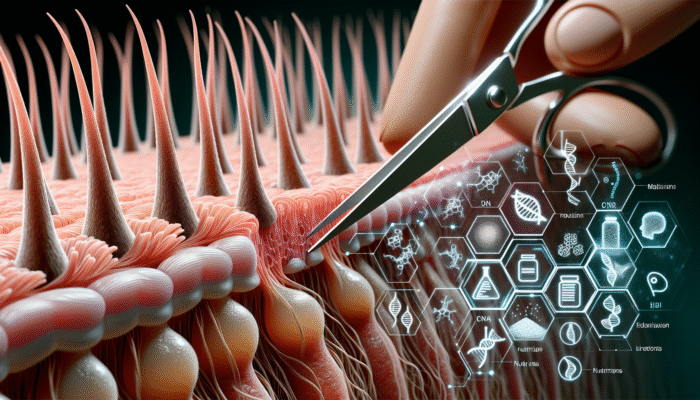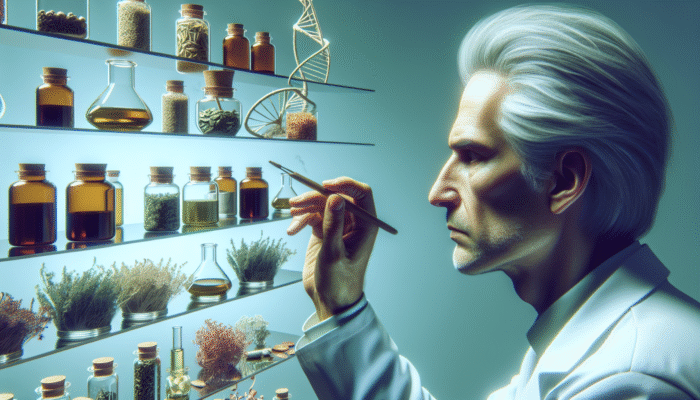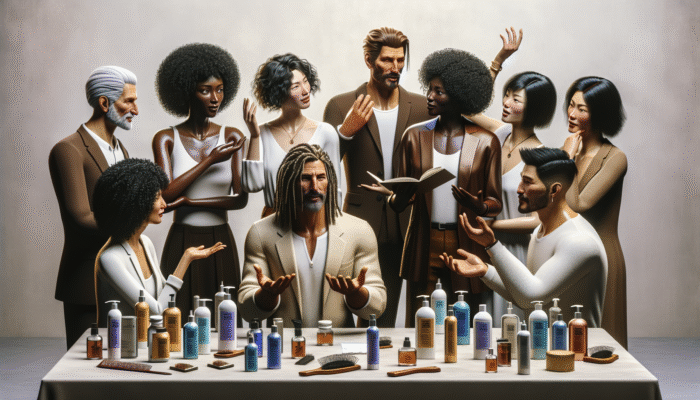Understanding Hair Treatments: Debunking Common Myths for Healthier Hair
Investigating the Truth: Can Cutting Hair Really Enhance Growth Rates?

The widely held belief that cutting hair can accelerate its growth is a misconception ingrained in our beauty standards. A deeper examination into the biological factors that drive hair growth reveals that hair lengthening is primarily influenced by the health of hair follicles, which are subject to a variety of elements such as genetics, overall wellness, and hormonal fluctuations. The actual rate of hair growth is largely determined by one’s unique genetic profile and dietary habits. Consequently, while trimming hair can enhance its appearance, it does not fundamentally change the biological processes that dictate how quickly hair grows.
People often equate hair trimming with faster growth because a fresh haircut can create an illusion of increased volume. When split ends are snipped away, hair can seem fuller and more radiant, leading to the misconception that growth has been stimulated. This highlights a common misunderstanding of the relationship between appearance and growth rate; while hair may look rejuvenated and healthier, the underlying growth rate remains unchanged. This temporary enhancement in volume can also boost self-esteem, reinforcing the belief that trimming leads to faster hair development.
To truly support and encourage healthy hair growth, individuals should adopt several effective strategies. Firstly, it is vital to maintain a balanced diet rich in essential vitamins and minerals. Nutrients like biotin, omega-3 fatty acids, and proteins are fundamental for nourishing hair from within. Additionally, focusing on scalp health through gentle massages and the use of appropriate hair care products can stimulate follicles, creating optimal conditions for robust growth. Protecting hair from environmental stressors and limiting the use of excessive heat styling tools is crucial for maintaining its health and longevity.
Moreover, the psychological benefits of regular hair trimming can contribute to a renewed sense of self, enhancing one’s perception of hair health. This emotional response can significantly improve self-esteem, allowing individuals to feel more positive about their appearance. Viewing hair trimming as a proactive measure to refresh one’s look can reinforce the idea that these practices contribute positively to the perception of hair growth. However, it’s essential to understand that hair care professionals indicate that while trimming maintains hair health, it does not directly influence the rate of growth or the thickness of hair.
In essence, despite the widespread belief that cutting hair boosts its growth, it is vital to recognize that hair growth is chiefly driven by genetics, nutritional intake, and overall health. Concentrating on dietary habits and scalp care provides significantly greater benefits for achieving effective hair growth than simply relying on haircuts.
Disproving the Myth: Does Frequent Hair Washing Lead to Hair Loss?
Many people mistakenly believe that washing hair too frequently contributes to hair loss, a myth that has been perpetuated in various circles. In truth, hair shedding is a natural component of the hair growth cycle, with an average person losing between 50 to 100 strands daily. This shedding is independent of how often one shampoos. Understanding this natural cycle is crucial for alleviating concerns associated with regular hair washing habits.
Shampooing is essential for sustaining scalp health and hygiene. Selecting the right shampoo can efficiently remove dirt, oil, and product buildup, which could otherwise lead to scalp issues. It’s important to choose shampoos that are tailored to your specific hair type and scalp condition. For instance, individuals with oily hair may find greater benefit from washing more frequently, while those with dry or curly hair should limit washing to preserve essential oils. Opting for gentle and hydrating shampoos is vital for promoting hair health and ensuring the scalp remains nourished and balanced.
Extensive research has investigated the relationship between shampoo frequency and hair loss. Studies published in the *Journal of Dermatology* have shown no significant evidence linking increased hair shedding to the frequency of shampooing. This challenges the traditional notion that washing hair frequently leads to more hair loss, reinforcing the understanding that key factors such as genetics, hormonal changes, and underlying health issues are the main contributors to hair loss.
For optimal hair health, it is advisable to choose shampoos that are devoid of harsh chemicals like sulfates and parabens, as these ingredients can cause dryness and damage. Additionally, employing a suitable conditioner can help maintain moisture levels in the hair, decreasing the likelihood of breakage and improving its overall appearance. Finding a balance in washing frequency is essential; listening to the specific needs of your hair and scalp should take precedence over adhering to outdated washing guidelines based on misconceptions.
To summarize, the belief that frequent shampooing is linked to hair loss is unfounded. Prioritizing scalp health, selecting appropriate hair care products, and understanding the natural hair growth cycle are far more critical for maintaining hair integrity than worrying about how often to wash.
Brushing Hair Excessively: The Myth of Achieving Healthier Locks
The idea that brushing hair 100 times a day enhances hair health is an outdated myth that originated from practices during the Victorian era. Back then, it was commonly thought that excessive brushing could distribute natural oils evenly, resulting in a shiny appearance. However, this outdated belief fails to consider modern hair care practices and the potential damage caused by over-manipulating hair.
In fact, overbrushing can be detrimental, particularly when hair is wet, as it is more susceptible to breakage. Excessive brushing can lead to frayed ends, resulting in split ends and an unhealthy look. The type of hair also dictates the appropriate frequency of brushing. For example, individuals with fine or delicate hair may need to brush less often to avoid damage, while those with thicker, coarser hair might handle more brushing without significant adverse effects.
Contemporary hair care professionals advocate for a more individualized approach to brushing. Rather than adhering to a predetermined number of strokes, individuals should focus on gentle detangling techniques that minimize breakage. Using a wide-tooth comb or a brush designed for detangling can greatly reduce the risk of damage, particularly for curly or coily hair textures. Additionally, applying a leave-in conditioner or a detangling spray can enhance the brushing process, making it smoother and offering protection to the hair against unnecessary stress.
Expert opinions on the myth of excessive brushing indicate a consensus that personalized hair care routines yield significantly better results than adhering to outdated practices. Dermatologists and trichologists emphasize the importance of recognizing individual hair needs and advise against the one-size-fits-all approach of brushing 100 times daily. Instead, they recommend developing a brushing routine that supports hair nourishment while preserving overall health.
In conclusion, the belief that excessive brushing leads to healthier hair is a misconception that disregards the complexities of modern hair care. The most effective way to maintain healthy, vibrant hair is to practice mindful brushing habits tailored to the unique characteristics of one’s hair type.
Examining the Myth: Is it Possible to Naturally Reverse Grey Hair?

The belief that grey hair can be reversed through natural remedies is a widespread myth that merits serious consideration. Grey hair is the result of reduced melanin production in hair follicles, a process primarily driven by genetics and the natural aging process. Currently, there are no scientifically validated natural methods to reverse this biological change, and many claims surrounding supplements and home remedies lack robust scientific support.
Common misconceptions regarding grey hair include the idea that stress plays a significant role in this condition. While stress can trigger temporary hair loss, its direct influence on the process of greying remains largely unsupported by scientific evidence. Research indicates that genetic predisposition is a far more important factor in determining when and how quickly an individual experiences greying. Recognizing this reality is essential for embracing the natural aging process and its accompanying changes.
For those facing grey hair, accepting this change can be a positive step toward self-acceptance. Many hair care brands now offer products specifically designed for grey hair, catering to its unique texture and needs. These specialized products can enhance the aesthetic appeal of grey hair, providing styling and maintenance options that celebrate rather than hide silver strands. Embracing grey hair can also serve as a powerful expression of individuality and self-confidence.
While various dietary supplements—such as vitamin B12 and folic acid—are often suggested as potential remedies for reversing grey hair, evidence supporting their effectiveness is limited. Although these vitamins are essential for overall hair health, they do not directly influence melanin production. Therefore, it is crucial to manage expectations regarding the impact of dietary changes on the appearance of grey hair.
The psychological effects of greying can be significant, impacting self-esteem and overall mental wellness. Many individuals struggle with societal beauty standards as they age. Understanding that going grey is a natural part of life can foster a healthier self-image and promote a more positive perspective on the aging experience.
In conclusion, the notion that grey hair can be reversed through natural methods is a myth without scientific validation. Embracing grey hair with proper care and a positive mindset can cultivate greater confidence and self-acceptance during the aging journey.
Are All Natural Hair Care Products Truly Superior for Hair Health?
Recently, there has been a significant surge in the popularity of natural hair care products within the beauty industry. However, the term “natural” can often be misleading. While many consumers believe that natural products are inherently superior for hair health, it is essential to examine the ingredients and their potential effects, as some natural components can be harmful to hair.
The definition of “natural” in hair products can vary greatly from one brand to another, and the regulatory standards governing this classification are often inconsistent. Ingredients derived from nature are not automatically safe; for instance, certain essential oils may cause scalp irritation or allergic reactions. Hence, consumers must meticulously scrutinize product labels and understand the implications of the ingredients they apply to their hair. Prioritizing the effectiveness of specific components—rather than focusing solely on their natural origin—can lead to more informed product choices.
When assessing hair care products, it is beneficial to consider individual hair types and specific concerns. For example, individuals with curly hair may prefer products enriched with natural oils for enhanced moisture, while those with fine hair might require lightweight formulations that do not weigh their hair down. The key lies in selecting products that cater to personal hair needs rather than merely following trends based on the allure of the “natural” label.
Additionally, many synthetic ingredients have been scientifically formulated to provide benefits that may not be attainable with natural alternatives. For example, silicone, despite being synthetic, can offer exceptional heat protection and smoothness, making it effective for various styling needs. Understanding the diverse functions of different ingredients and their performance can aid in making choices that prioritize hair health and desired results.
In summary, while the appeal of “natural” hair products is understandable, it is vital to approach this trend with a discerning attitude. Evaluating the ingredients and their appropriateness for your hair type is far more critical than simply opting for products based on the allure of being “natural.”
Does Hair Coloring Lead to Hair Loss?
The concern that hair dye contributes to hair loss is common among individuals who enjoy changing their hair color. While it is true that hair dye can potentially damage the hair shaft, it does not directly cause hair loss. Understanding this distinction is crucial for anyone looking to enhance their appearance through color treatments.
Hair dye alters the natural structure of hair, which can lead to dryness and brittleness. This damage is often exacerbated when harsh chemical dyes or improper dyeing techniques are utilized. However, the actual impact on hair loss is relatively minimal. Hair strands may appear thinner or seem to fall out due to breakage, but this is distinctly different from the loss of hair follicles.
Practicing safe hair dyeing methods is essential to minimize potential damage from hair dye. This includes conducting patch tests to avoid allergic reactions and using specially formulated products designed to minimize harm. Preparing the hair prior to dyeing, such as through deep conditioning treatments, can strengthen strands, making them less susceptible to the adverse effects of dye. Moreover, considering alternative options such as semi-permanent dyes or natural choices like henna can allow for color enhancement without exacerbating damage.
For those concerned about hair health while coloring, consulting with a professional stylist can provide valuable guidance on the best techniques and products, ensuring that the dyeing process is both safe and effective. Additionally, regular trims can help maintain hair integrity, reducing signs of damage and promoting healthier growth.
In conclusion, while hair dye can cause some level of damage to the hair itself, it does not directly lead to hair loss. By employing safe dyeing practices and making informed product selections, individuals can enjoy the aesthetic benefits of hair color without compromising their hair’s overall health.
Frequently Asked Questions About Hair Care and Treatments

Does trimming my hair have any effect on its growth rate?
No, trimming hair does not influence its growth rate. Hair growth occurs at the follicle level and is primarily dictated by genetics and overall health, rather than how often hair is cut.
Is washing my hair every day unhealthy for my hair?
Washing hair daily may not be necessary for everyone. It largely depends on hair type; individuals with oily hair may benefit from daily cleansing, while those with dry or curly hair might need to wash less frequently to preserve moisture.
How often should I brush my hair for optimal health?
The frequency of brushing is contingent upon hair type. Properly detangling once or twice daily is generally sufficient; excessive brushing should be avoided to prevent breakage and damage.
Can grey hair revert to its original color?
Currently, there are no scientifically validated methods to naturally reverse grey hair. Grey hair is the outcome of genetic factors and a decrease in melanin production.
Are natural hair products always the best choice for my hair?
Not necessarily. Although natural products can offer benefits for hair, some natural ingredients may be harsh. It is essential to assess ingredients and their effects based on individual hair types and specific needs.
Does hair dye contribute to thinning hair?
Hair dye can cause damage to the hair shaft, which may lead to breakage and the perception of thinning hair. However, it does not directly cause hair loss from the follicles.
Are there particular foods that promote healthy hair growth?
Foods rich in vitamins A, C, D, E, zinc, iron, and omega-3 fatty acids are beneficial for promoting healthy hair growth. A balanced diet can significantly enhance overall hair health and stimulate growth.
Is stress a significant factor in the greying of hair?
Although stress can lead to temporary hair loss, its direct connection to greying hair is largely unsubstantiated. Genetics plays a more substantial role in determining when and how quickly hair greys.
Should I stop shampooing if my hair is thinning?
No, discontinuing shampooing is unnecessary. Instead, focus on using gentle, suitable products that maintain scalp health, which can help promote hair vitality and strength.
How can I improve the condition of my dyed hair?
To maintain the health of dyed hair, use color-safe shampoos and conditioners, minimize heat styling, and incorporate regular deep conditioning treatments to nourish and protect hair.
Connect with Us on Facebook for More Insightful Hair Care Tips!
The Article: Common Hair Treatment Myths Debunked: Unveiling the Truth appeared first on Amitys Hair Salon.
The Article Hair Treatment Myths Debunked: Discover the Truth Was Found On https://limitsofstrategy.com





No responses yet